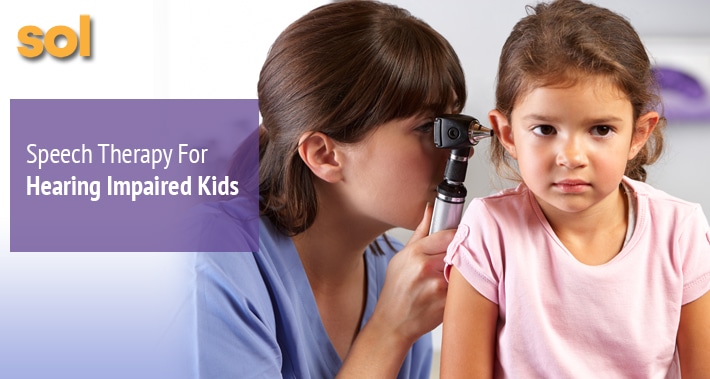
Finding out your child could have a hearing impairment can be an overwhelming experience.
And the long list of treatment options available certainly doesn’t help this feeling.
For instance, you might be wondering whether or not you should amplify your child’s hearing.
Or maybe you’re wondering which types of speech therapy for children will be most beneficial to your child’s hearing and language development.
Well, first things first: take a deep breath.
You don’t have to figure it out all on your own.
With locations in both Austin and Round Rock, Sol Speech and Language Therapy we can help guide you through the steps to getting your hearing impaired child the interventions and support they need.
That’s why we’ve put together this blog article.
Let’s take a closer look.
What Is Hearing Impairment?
A hearing impairment refers to some sort of issue with your child’s hearing.
The impairment can range from mild to profound.
Subsequently, the corresponding amount of hearing loss may range from a mild impairment to complete deafness.
Some hearing impaired children can understand the gist of a conversation but may miss out on certain sounds or details.
Others may have particular difficulty hearing in a noisy or distracting environment, such as a busy mall.
Some forms of hearing loss present as temporary impairments due to an underlying condition, such as an ear infection.
Others are permanent conditions.
Additionally, a hearing impairment may be present at birth or develop later in life.
Is Hearing Impaired The Same As Deaf?
Not quite.
Both hearing impairments and deafness describe some level of hearing loss.
Nonetheless, they have different implications and therefore shouldn’t be used interchangeably.
Children with hearing impairments can typically still hear some sound, however slight.
Conversely, Deaf children experience complete or near complete hearing loss.
Different Types Of Hearing Loss
The variations in hearing loss don’t stop there.
Your ears are made of three parts: the outer ear, the middle ear, and the inner ear.
Hearing loss can occur in any one, or multiple, of these parts.
Depending on the location of the hearing loss, hearing impairments can be sorted into three basic subtypes: conductive hearing loss, sensorineural hearing loss (SNHL), and mixed hearing loss.
1. Conductive Hearing Loss
Conductive hearing loss occurs due to an inability for sound to pass between your outer and middle ear.
If your child has conductive hearing loss, they might struggle to hear particularly soft or quiet sounds.
They may be able to hear louder sounds, albeit muffled.
Conductive hearing loss may be caused by a number of factors, including:
- Ear fluid brought on by allergies or sickness
- Infection inside of the ear (otitis media)
- Infection in the ear canal (otitis externa)
- Eustachian tube dysfunction
- A hole in the eardrum
- Benign (non cancerous) tumors
- Earwax build up in their ear canal
- An object stuck in their ear, such as a small toy or a piece of food
- A congenital defect in their middle or outer ear
With medications or surgery, conductive hearing loss can often be reversed.
2. Sensorineural Hearing Loss (SNHL)
Sensorineural hearing loss typically occurs due to one of two factors: inner ear damage or problems with the nerve pathways in your inner ear.
If your child’s been diagnosed with sensorineural hearing loss, they might struggle to hear soft, quiet sounds.
Additionally, louder sounds may be unclear or muffled.
Causes of sensorineural hearing loss include:
- Illnesses, such as hepatitis B
- Drugs that are toxic to hearing, such as sulindac or naproxen
- Having a family history of hearing loss
- Aging
- Head trauma
- Inner ear abnormalities
- Exposing your ears to loud noises or explosions
Sensorineural hearing loss is one of the most common types of permanent hearing loss.
Unfortunately, it can’t be reversed with currently known techniques.
3. Mixed Hearing Loss
As the name suggests, mixed hearing loss describes hearing impairments caused by a combination of conductive and sensorineural factors.
In these instances, the damage is located in the both the outer or middle ear, as well as the inner ear or the nerve pathways.
Subsequently, mixed hearing loss may be caused by any combination of factors that causes conductive hearing loss and sensorineural hearing loss.
For instance, consider a child born with an eustachian tube malfunction who later goes on to contract hepatitis B.
In this scenario, the associated hearing loss might be worse than if only one of the factors were present.

How To Tell If Your Child Has Hearing Loss?
Now that you know a bit more about the different types of hearing impairments, you might be wondering how to tell if your child is living with hearing loss.
The symptoms of hearing loss can differ depending on the specific subtype.
However, there are some common symptoms.
If your child is living with a hearing impairment, they might:
- Difficulty understanding abstract words, such as “love”, “freedom”, and “courage”
- Leave out certain words, such as “the”, “an”, and “a”
- Difficulty understanding the multiple meanings of a word, such as a dog’s “bark”, and tree “bark”
- Difficulty using and understand short sentences, as well as more complex sentences
- Difficulty understanding and using passive voice
- Difficulty using quiet, soft sounds, such as “s”, “sh”, or “th”
- Speak too loud, too soft, or in too high of a pitch
If you believe that your child might be hearing impaired, consider taking them to an audiologist for a test.
Can Hearing Loss Affect Language Development?
In order for your child to develop their language skills, they have to be able to effectively communicate.
And since kids with hearing impairments often have trouble hearing common sounds in the English language, such as “th” and “sh”, their language development can start to suffer.
After all, you can’t exactly learn to speak a language without being able to hear half of it.
Therefore, children with hearing impairment might struggle with multiple speech and language skills, such as:
- Understanding conversations
- Following directions
- Building vocabulary and grammatical skills
- Speaking clearly and coherently
In children with profound hearing loss, these difficulties may become so serious that they significantly interfere with the ability to learn language in traditional ways.
And without intervention, your child could completely lose their ability to learn language.
That’s why early intervention is so important.
Next, we’ll look at some therapeutic options for hearing impaired kids.
Speech Therapy For Hearing Impairments
Speech therapy is an ideal form of intervention for hearing impaired children.
As we previously mentioned, early intervention is key.
Children whose hearing impairments are identified at birth should begin therapy by 6 months of age whereas children whose impairments are identified later should begin immediately.
Since speech therapists are language experts, they can help your hearing impaired child develop their communication skills in a variety of ways.
Let’s take a look at a few examples.
1. Deciding On Alternative And Augmentative Communication
Augmentative and alternative communication (AAC) is a technique used in speech therapy.
It provides hearing impaired children with tools or accommodations to help them communicate more effectively.
One of the most common examples is sign language.
Some parents of hearing impaired children prefer a sign language only approach.
In these cases, children and their caretakers use sign language exclusively.
This approach is most common amongst Deaf communities where sign language is valued as part of Deaf culture.
Other parents of hearing impaired children prefer an auditory/verbal approach where sign language or visual cues aren’t introduced.
Instead, the child is encouraged to utilize whatever hearing they have, with or without amplification.
In most cases, a combination approach to treatment is ideal.
These types of approaches simultaneously utilize verbal communication as well as sign language and/or cue cards.
The benefit is that your child gets exposed to both an auditory and visual message, thereby strengthen their communication skills.
2. Referral To An Audiologist Where Necessary
Audiologists have a special interest in preventing, diagnosing, and providing rehabilitation for hearing loss.
If your child’s pediatrician suspects hearing loss, they may refer you to an audiologist for further assessment and confirmation.
The assessment involves monitoring your child’s brain waves to determine the amount of sounds they are hearing.
Your child’s audiologist can also help with any amplification tools, such as hearing aids or cochlear implants.
3. Other Treatment Options
There are additional treatment options available for children with hearing impairments.
To close, we’ll briefly discuss two of them.
In listening and spoken language therapy, for instance, your child will learn to process sounds and develop their listening skills.
Alternatively, auditory oral or auditory based speech therapy uses methods such as lip reading to increase listening and communication skills.
Book Your Appointment With Sol Speech And Language Therapy Today
As speech-language pathologists, we care about more than just your child’s hearing.
We seek to provide comprehensive care that’ll help your hearing impaired child develop a variety of skills, including language, communication, and listening skills.
Book your appointment with Sol Speech And Language Therapy today to help your child have a better tomorrow.
6448 E Hwy 290 Suite E-108,
Austin, TX 78723
(512) 368-9488
» https://g.page/r/CfRfhOpEQm7BEAE
Sol Speech & Language Therapy
555 Round Rock W Dr E-221,
Round Rock, TX 78681
(512) 808-3953
» https://g.page/r/Cb5pwCTosSEfEBM
Sol Speech & Language Therapy offers personalized skilled intervention to those struggling with their speech and language skills. Services offered include screening, consultation, and comprehensive evaluation. We also provide one-on-one and/or group therapy for speech sound disorders, receptive/expressive language delay/disorder, stuttering/cluttering, accent reduction, and much more.